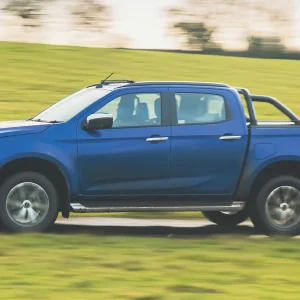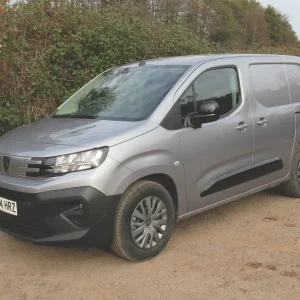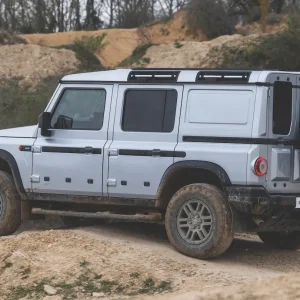There was considerable disappointment in the market when Ford pulled the plug on its much-loved Fiesta Van in 2017, but its absence was mercifully short as the brand brought the model back just a year later, having decided there was life left in the car-derived van sector after all.
The timing of the Fiesta Van’s return just as its main rival, Vauxhall’s Corsavan, made its exit may not have been entirely coincidental.
The Fiesta Van now serves alongside its arguably more practical stablemate, the purpose-built Transit Courier cubed van, in the sub-2.0t segment.
The Courier offers a 660kg payload and 2.4m3 loadspace, compared with the 515kg and 1.0m3 of the Fiesta Van. But if the more bijou load dimensions of the car-derived van are all you need, then for driveability and kerb appeal the Fiesta Van wins the day.
Ford introduced mild hybrid technology to the Fiesta Van in August last year, and driven here is the flagship Sport version (it is also available in Trend trim).
The hybrid model gets Ford’s 125hp, 1.0-litre, 48v EcoBoost petrol powertrain. The engine is lively and thrums contentedly when on the move, but instantly cuts out when the efficient start/stop system kicks in at junctions and traffic lights.
Ford says the fuel efficiency of the Fiesta Van MHEV is enhanced by up to 24Nm of electric torque. while performance is boosted by up to 50Nm of electric torque at low speeds.
A belt-driven integrated starter/generator (BISG) in place of the standard alternator enables recovery and storage of energy usually lost during braking and coasting to charge a 48v lithium-ion air-cooled battery pack.
Ford says the BISG extends the range of the van’s automatic start/stop technology to deliver greater fuel savings, including when coasting to a stop below 15mph and when the vehicle is in gear with the clutch pedal depressed.
The BISG also acts as a motor, integrating with the engine and using the stored energy to provide torque assistance during normal driving and acceleration, as well as running the vehicle’s electrical ancillaries.
The technology contributes to fuel efficiency of up to 55.3mpg and 115g/km on the WLTP cycle, an improvement of as much as 6% compared with the non-hybrid model, Ford claims. The Fiesta Van’s handling is first class: not just car-like but like a nimble, responsive small hatchback car, which is essentially what it is with the rear seats removed to create the load space.
The steering is nicely weighted and impressively precise. The Sports-style flat-bottomed steering wheel offers plenty of feedback, and works harmoniously with the slick six-speed manual gearbox – a combination that can encourage an enthusiastic driving style, so drivers should be careful not to stray above legal speed limits.
The steering wheel is rake and reach-adjustable which, together with a four-way adjustable seat, makes it easy to find the most comfortable driving position, although those more used to being perched higher up in van cabins may find the seat a little close to the ground until they get used to it.
On the other hand, the entrance to the load area is high compared to that of the Courier, so care should be taken if lifting heavy cargo on board.
A steel bulkhead topped off by a full-height mesh grille is fitted to protect the driver and passenger from wayward loads. Thanks to four tie-down points, however, it should be possible to lash down items that might shift about. Access to the cargo area is solely by way of a rear hatch door and the load bed is protected by a tailored rubber mat.
The Fiesta Van Sport’s style is enhanced by a body kit including unique front and rear bumpers, side skirts, fog lamps and a chrome exhaust extension. It is adorned with 17in alloy wheels but also comes with a 14in steel spare wheel.
The van tested here was laden with extra cost options, including a £566 (all prices exclude VAT) Exclusive adaptive cruise control pack with pre-collision assist, distance indication, distance alert, intelligent speed assistance, driver impairment monitor, speed sign recognition, lane departure warning and lane keeping aid.
We also got the blind spot information system with cross-traffic alert (£336), and the heated seats (£48) and steering wheel (£77) were a bonus in cold weather. Curiously though, there were no parking sensors.
Ford Fiesta Sport Van 1.0L MHEV
Price (ex VAT) £17,162
Price range (ex VAT) £15,142-£17,222
Insurance group 3E
Warranty 36 months/60,000mls
Service intervals 10,000mls
Gross payload 515kg
Load volume 1.0m3
Engine size/power 999cc / 125hp
Combined fuel economy 65.7mpg
CO2 116g/km





